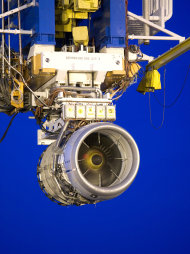July 4, 2011
Those and other advances have positioned airlines for the biggest gains in fuel efficiency since the dawn of the jet age in 1958. For airlines, more efficient jets will reduce their biggest expense. For passengers, it means fares won't jump around as much with the price of oil.
"We're seeing 25 years of improvements compressed into 10 years," says Hans Weber, president of TECOP International, an aviation consulting firm.
Airlines' urgency to reduce fuel use is being driven by two trends: soaring oil prices and tougher environmental regulations.
Pressured by airline executives for improvements, manufacturers have pushed the frontiers of technology by building lighter planes and borrowing essential engine-design advances from the auto industry, like automatic transmissions.
Airplane manufacturers have already reduced fuel consumption twice as much as car and train manufacturers have. In 1980, it took an average of 46 gallons of fuel to fly a passenger 1,000 miles. Today, it takes 22, according to an AP analysis of Department of Transportation data. Experts say the coming improvements could bring that number below 18 within a decade.
To read more click here...

0 comments:
Post a Comment